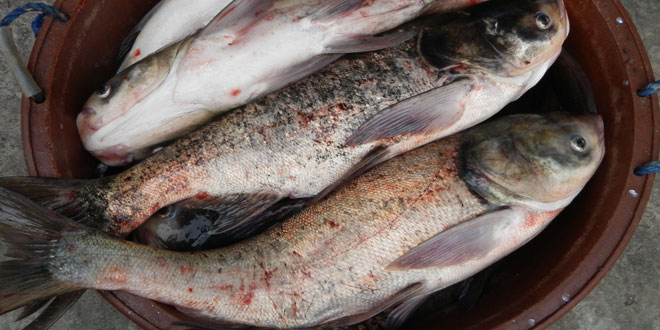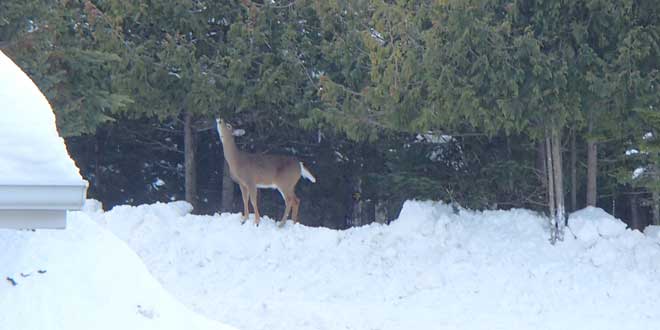ONTARIO—A bill calling for the construction of a physical barrier to keep Asian carp out of the Great Lakes is getting a lot of support. The bill has been proposed by US representative Candice Miller and would authorize the United States Army Corps of Engineers (USACE) to design and construct a barrier to separate the Mississippi River watershed, where the invasive Asian carp is well-established, from the Great Lakes, where the species could devastate a $7 billion year commercial and sport fishing industry.
“That would be good news,” said local resident Mike Wilton of the proposed bill. “Good for her (Ms. Miller). This has been a logical answer to this issue from day one to make sure Asian carp don’t get into the Great Lakes. Certainly from my perspective it would protect the fishery and would also help increase lake levels. It would be the cheapest and most logical thing to do.”
“Definitely, this would be a positive move,” stated Mr. Wilton.
Mary Muter, chair of the Great Lakes section of the Sierra Club of Ontario, pointed out Ms. Miller, “is proposing this bill in response to USACE having recently released its study on what can be done to keep Asian carp out of the Great Lakes. One of the eight options they provided was to ‘do nothing’ and another was for full closure of the waterway that would cost $20 billion, and basically what she is saying is that we should be focusing on separating the (Mississippi River) watershed.”
“I would hope that she (Ms. Miller) receives bi-partisan support for this bill and it is passed by the US Senate,” said Ms. Muter. “Ultimately this option (as is the case with others) would need funding, and obviously it would need to be joint (US-Canada) funding. The question is whether our (Canada) government would share in the costs, but it is very good news. Ms. Miller has stepped up on this issue.”
In a press release, Larry Miller, MP for Bruce-Grey-Owen Sound, also stated his support for the legislation that is tabled in the United States. “I strongly support the legislation that has been put forward by Candace Miller. There have been instances where the current protection system has failed and Asian carp seem to find a way into the Great Lakes.”
“I fully agree that totally separating the Mississippi River from the Great Lakes is the only way to ensure that Asian carp do not enter the Great Lakes,” said Mr. Miller. He said he would be writing to the Honourable Gail Shea, Minister of Fisheries and Oceans, as well as the Honourable John Baird, Minister of Foreign Affairs, to urge the (Canada) government to support this legislation.
Jake Van Rooyen, manager of the fish hatchery the Bluewater Anglers Club which operates in Point Edward, Ontario told the Sarnia Observer in its February 5, 2014 edition that the bill proposed by Ms. Miller “would be ideal,” but questioned whether politically it will ever happen.
The Bluewater Anglers are among many groups calling for a physical barrier to keep Asian carp out of the Great Lakes. He said the current approach to keeping Asian carp from entering the Great Lakes at Chicago relies on electric fences, but there has already been an instance where a power failure caused the barrier to be down for several minutes. He said there are also other potential ways for the Asian carp to find their way to the lakes.
Ms. Miller said the man-made connection between the Great Lakes and Mississippi River system created a century ago should never had been allowed to happen. “I believe total separation is the only way to make sure that Asian carp do not enter the Great Lakes,” she said in a statement.
On the issue of the recent USACE study, an Ontario public meeting is being set up with USACE to allow Ontarians an opportunity to provide input on the USACE study.
“We’re aiming to hold a public meeting in the Greater Toronto Area in late March and will be inviting representatives of USACE, the Department of Fisheries and Oceans and the Ministry of Natural Resources,” said Ms. Muter. “USACE is still in consultations, but none of the public consultations are being held in Canada, and the study that was completed does not mention Canada at all.”
“March 27 has been set for the hearing Canadian to be held (in Toronto),” said Ms. Muter. “USACE representatives need to be there to hear from Canadians and get input. The report does not mention Canada at all, but Canadian interests need to be heard.”




